It’s Always Fair Weather is best enjoyed by middle-aged viewers who can identify with the malaise and disillusionment of the three principal characters, and since this has never been the primary demographic among moviegoers, it was probably inevitable this movie would fail. That plus the fact MGM musicals were beginning to pall at the wickets --- for every Seven Brides For Seven Brothers, there were six like Brigadoon, Hit The Deck, Athena, Deep In My Heart --- such a reservoir of red ink raises the question as to why they kept doing them at all. Here’s a surprising factoid for Gene Kelly’s fans --- every single feature he did for Metro after Singin’ In The Rain lost money. A few of the specific losses, in millions --- Brigadoon ($1.4) --- It’s Always Fair Weather ($1.5) --- Invitation To The Dance ($2.4) --- and Les Girls ($1.5). You begin to wonder how he even got a pass to drive on the lot. I’m awfully glad he did though, because It’s Always Fair Weather is one terrific MGM musical, the Little Big Horn of valiant song and dancers staging one more big show as their fickle audience retreats home to their televisions and rock ‘n roll platters. Its domestic rental was a woeful $1.4 million. Within a year, a black and white piece of cheese called Love Me Tender would take home $4.2. Times and tastes, they were a-changin’.
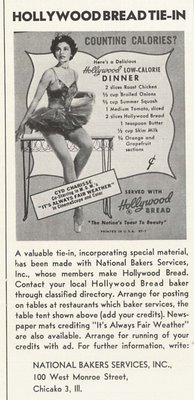
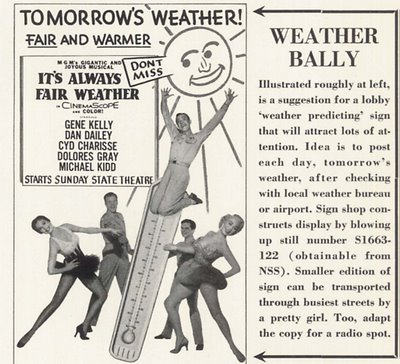
A lot of people like this musical because of its "dark" aspects --- that’s probably gotten it through a lot of revival house and university doors where it might otherwise have been snubbed. It’s mostly Dan Dailey’s character hauling that baggage, and all because he’s been "reduced" to designing animated commercials for television! Now maybe I’m misinformed as to the definition of success on Madison Avenue in the fifties, but I would think any guy who’d developed a nationwide ad campaign, in any media, would have to be considered an up-and-comer, if not an already-got-there. Greg Peck’s Man In The Grey Flannel Suit could have fixed up that shabby old house and gotten Jennifer Jones off his back had he pulled off such a coup. I suspect poor Dan’s despair lay in the fact that he’d whored himself out to television, and that in itself was enough to bring on (well deserved) alcoholism and ulcers for any character in an MGM feature. Every depiction of TV here is a withering putdown, whether it be Dolores Gray’s hostess gorgon, or a barroom cutaway to those inane cartoon ads Dailey’s Doug Hallerton has inflicted upon a nationwide audience. It’s even implied that Doug’s marriage might become a direct casualty of his misdirected creative energies. His whole "life of degradation" speech at the end is really Doug’s confession of having degraded himself through an association with television. In fact, all three principals react to their video debuts as though they’d been tossed head-first into the ninth ring of hell. Only a questionably motivated donnybrook and full-scale disruption of this vulgar broadcast can redeem their integrity.
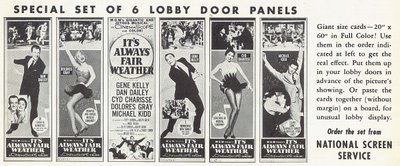
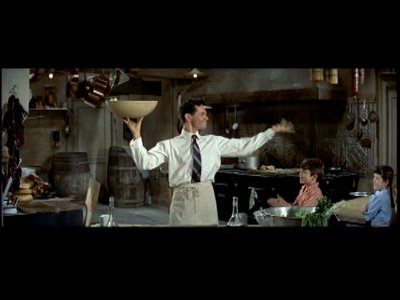
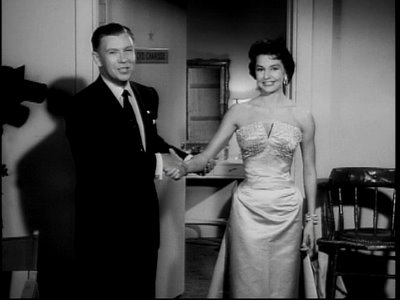
Michael Kidd had to feel some resentment after four day’s rehearsal and a day and a half shooting on his solo number, "Jack and The Space Giants" (shown here), only to see the number excised at Kelly’s insistence. The footage is included as an extra on the DVD, and Kidd’s dexterity with kitchen utensils is a sight to behold --- he actually reminded me of those acrobatic routines Roscoe Arbuckle used to execute when playing a cook and/or waiter in the silent days. They say Kelly nixed the act because Kidd employed little kids as an appreciative on-screen audience, and Gene couldn’t abide the notion of anyone else using moppets for props. That was his specialty. Dan Dailey’s big lampshade routine nearly went into Gene's dustbin as well, but co-director Stanley Donen fought to keep it. He described the job with Kelly thus: It was an absolute, one-hundred percent nightmare, and this within twenty years after the 1955 experience, when both men were still active in the business and would presumably encounter one another (at least socially) from time to time. You’d have to assume Kelly was a real pill on this show, but that roller-skate number sure redeems him for me. It’s got to be among the top three of any dances the man ever performed. Even if It’s Always Fair Weather were an otherwise lousy movie (which it certainly is not), this segment would place it among the immortals.
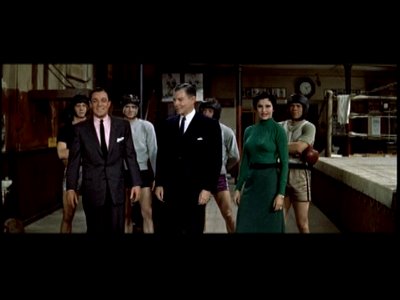
The expansive ad you see here was actually a fold-out herald inserted into newspapers, grocery bags, mailboxes --- you name it --- and the cost to exhibitors was $5.25 per one thousand. A price increase went into effect on July 1, 1955 --- from that date they'd be $9.25 per K. The stars with outstretched hands around the title were a less than inspired marketing image used for virtually all the poster art, even making its way to the recent DVD cover. Overrall a pretty anemic campaign, and that probably had something to do with resulting weak attendance. One remarkable exception are the fantastic door panels illustrated here. Each of these six in the set were full color and stood sixty inches high, by twenty inches across. They are gorgeous and almost impossible to find today. Metro provided these on most of its big pictures between 1950 and 1955. None of them were cheap, so exhibitors used door panels sparingly. I found a bunch scrounging an old theatre some thirty years ago, and believe me, they’re incredible. This Wonderbread tie-in with Cyd Charisse makes me wonder --- was Cyd informed as to each ad bearing her image? I suppose she signed a release. Maybe not. Probably sitting at home reading Woman’s Home Companion, and there it was. The "Weather Bally" was inevitable, I suppose, but would it have lured patrons? Doubt it. If anything drove off business, it was probably the fact George Murphy was giving away the movie on TV’s MGM Parade, an 1955-56 ABC series operating on the assumption home audiences would happily sit through old theatrical shorts, heavily abridged features, and random clips just to get a glimpse of Metro’s forthcoming releases. Two of the episodes featured the best songs from It’s Always Fair Weather in their virtual entirety (that’s George Murphy and Cyd Charrise setting one up for the viewers). Schizophrenic Metro was feeding the video monster even as they tried so desperately to resist the erosion it was causing for their boxoffice. Yet another number was a gratuity for audiences in an MGM Cinemascope short made the same year, Salute To The Theatres, in which Murphy visits the set (shown here) and persuades Gene Kelly to make with a free song and dance. Poor George was like the tent show barker that gives up the whole show on the outside before anyone has a chance to pay for the privilege of coming inside.


A lot of people like this musical because of its "dark" aspects --- that’s probably gotten it through a lot of revival house and university doors where it might otherwise have been snubbed. It’s mostly Dan Dailey’s character hauling that baggage, and all because he’s been "reduced" to designing animated commercials for television! Now maybe I’m misinformed as to the definition of success on Madison Avenue in the fifties, but I would think any guy who’d developed a nationwide ad campaign, in any media, would have to be considered an up-and-comer, if not an already-got-there. Greg Peck’s Man In The Grey Flannel Suit could have fixed up that shabby old house and gotten Jennifer Jones off his back had he pulled off such a coup. I suspect poor Dan’s despair lay in the fact that he’d whored himself out to television, and that in itself was enough to bring on (well deserved) alcoholism and ulcers for any character in an MGM feature. Every depiction of TV here is a withering putdown, whether it be Dolores Gray’s hostess gorgon, or a barroom cutaway to those inane cartoon ads Dailey’s Doug Hallerton has inflicted upon a nationwide audience. It’s even implied that Doug’s marriage might become a direct casualty of his misdirected creative energies. His whole "life of degradation" speech at the end is really Doug’s confession of having degraded himself through an association with television. In fact, all three principals react to their video debuts as though they’d been tossed head-first into the ninth ring of hell. Only a questionably motivated donnybrook and full-scale disruption of this vulgar broadcast can redeem their integrity.



Michael Kidd had to feel some resentment after four day’s rehearsal and a day and a half shooting on his solo number, "Jack and The Space Giants" (shown here), only to see the number excised at Kelly’s insistence. The footage is included as an extra on the DVD, and Kidd’s dexterity with kitchen utensils is a sight to behold --- he actually reminded me of those acrobatic routines Roscoe Arbuckle used to execute when playing a cook and/or waiter in the silent days. They say Kelly nixed the act because Kidd employed little kids as an appreciative on-screen audience, and Gene couldn’t abide the notion of anyone else using moppets for props. That was his specialty. Dan Dailey’s big lampshade routine nearly went into Gene's dustbin as well, but co-director Stanley Donen fought to keep it. He described the job with Kelly thus: It was an absolute, one-hundred percent nightmare, and this within twenty years after the 1955 experience, when both men were still active in the business and would presumably encounter one another (at least socially) from time to time. You’d have to assume Kelly was a real pill on this show, but that roller-skate number sure redeems him for me. It’s got to be among the top three of any dances the man ever performed. Even if It’s Always Fair Weather were an otherwise lousy movie (which it certainly is not), this segment would place it among the immortals.

The expansive ad you see here was actually a fold-out herald inserted into newspapers, grocery bags, mailboxes --- you name it --- and the cost to exhibitors was $5.25 per one thousand. A price increase went into effect on July 1, 1955 --- from that date they'd be $9.25 per K. The stars with outstretched hands around the title were a less than inspired marketing image used for virtually all the poster art, even making its way to the recent DVD cover. Overrall a pretty anemic campaign, and that probably had something to do with resulting weak attendance. One remarkable exception are the fantastic door panels illustrated here. Each of these six in the set were full color and stood sixty inches high, by twenty inches across. They are gorgeous and almost impossible to find today. Metro provided these on most of its big pictures between 1950 and 1955. None of them were cheap, so exhibitors used door panels sparingly. I found a bunch scrounging an old theatre some thirty years ago, and believe me, they’re incredible. This Wonderbread tie-in with Cyd Charisse makes me wonder --- was Cyd informed as to each ad bearing her image? I suppose she signed a release. Maybe not. Probably sitting at home reading Woman’s Home Companion, and there it was. The "Weather Bally" was inevitable, I suppose, but would it have lured patrons? Doubt it. If anything drove off business, it was probably the fact George Murphy was giving away the movie on TV’s MGM Parade, an 1955-56 ABC series operating on the assumption home audiences would happily sit through old theatrical shorts, heavily abridged features, and random clips just to get a glimpse of Metro’s forthcoming releases. Two of the episodes featured the best songs from It’s Always Fair Weather in their virtual entirety (that’s George Murphy and Cyd Charrise setting one up for the viewers). Schizophrenic Metro was feeding the video monster even as they tried so desperately to resist the erosion it was causing for their boxoffice. Yet another number was a gratuity for audiences in an MGM Cinemascope short made the same year, Salute To The Theatres, in which Murphy visits the set (shown here) and persuades Gene Kelly to make with a free song and dance. Poor George was like the tent show barker that gives up the whole show on the outside before anyone has a chance to pay for the privilege of coming inside.

